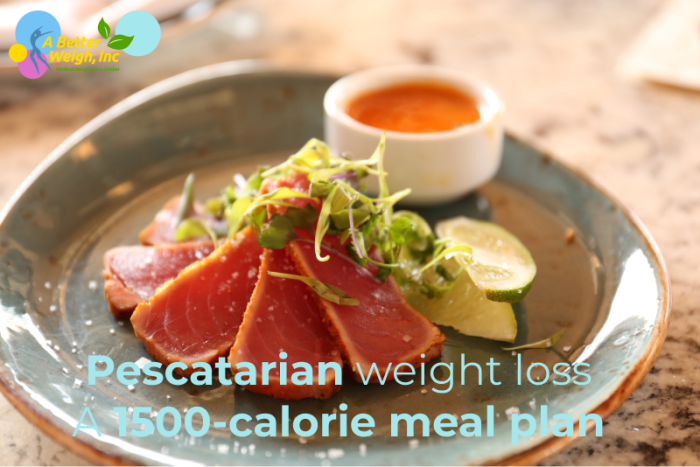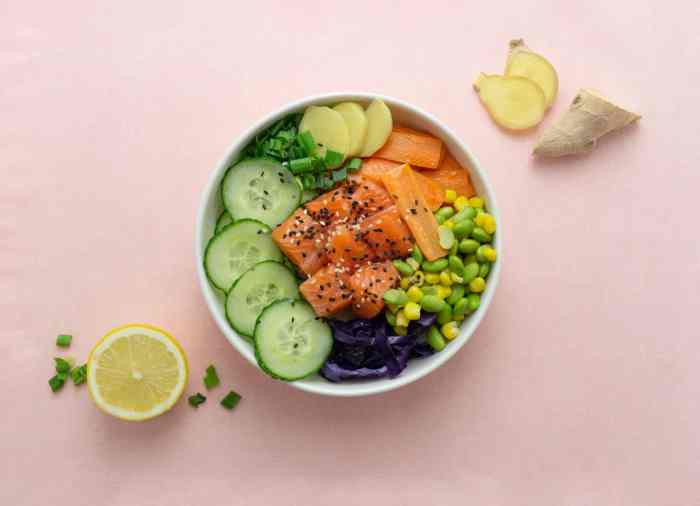Pescatarian weight loss is a unique and effective approach to shedding pounds and improving overall health. By incorporating fish and seafood into a balanced diet, individuals can reap the benefits of lean protein, omega-3 fatty acids, and a host of other nutrients that promote satiety, reduce inflammation, and support heart health.
In this comprehensive guide, we will delve into the nutritional benefits of a pescatarian diet, provide tips for creating a balanced and calorie-controlled meal plan, and discuss the challenges and considerations associated with this eating style. Additionally, we will explore the health benefits beyond weight loss, such as reduced risk of chronic diseases and improved mood and cognitive function.
Introduction
Pescatarianism is a diet that includes fish and seafood but excludes meat and poultry. It has gained popularity as a healthier alternative to traditional meat-based diets. Research suggests that pescatarianism may have beneficial effects on weight loss due to its focus on nutrient-rich foods like fish, fruits, and vegetables.
Prevalence and Association with Weight Management
Studies indicate that pescatarians tend to have lower body mass index (BMI) and body fat percentage compared to non-vegetarians. A study published in the journal “Nutrients” found that pescatarians had significantly lower BMI and waist circumference than meat-eaters. Another study in the “American Journal of Clinical Nutrition” reported that pescatarians lost more weight and body fat than meat-eaters over a 12-week period.
Nutritional Benefits of a Pescatarian Diet

Adopting a pescatarian diet offers an array of nutritional benefits. Fish and seafood are rich sources of high-quality protein, which plays a crucial role in promoting satiety, supporting muscle growth and repair, and maintaining overall health.
Omega-3 Fatty Acids
Pescatarian diets are particularly renowned for their high content of omega-3 fatty acids, which are essential fatty acids that the body cannot produce on its own. Omega-3s have been extensively studied for their anti-inflammatory properties and their ability to support heart health.
- Reduced Inflammation:Omega-3s help reduce inflammation throughout the body, which can alleviate symptoms of chronic conditions such as arthritis, asthma, and inflammatory bowel disease.
- Improved Heart Health:Omega-3s have been shown to lower blood pressure, reduce triglyceride levels, and improve blood flow, all of which contribute to a healthier heart.
Examples of Healthy Pescatarian Meals
Incorporating fish and seafood into your diet is easy and versatile. Here are a few examples of healthy pescatarian meals that showcase the variety of options available:
- Grilled Salmon with Roasted Vegetables:Grilled salmon provides a lean protein source, while roasted vegetables offer a colorful array of vitamins and minerals.
- Tuna Salad with Mixed Greens:Tuna salad is a quick and easy lunch option that combines protein-rich tuna with the fiber and nutrients of mixed greens.
- Seafood Chowder:A warm and comforting dish, seafood chowder features a variety of seafood in a creamy broth.
Meal Planning for Pescatarian Weight Loss
Creating a balanced and calorie-controlled pescatarian meal plan is essential for successful weight loss. Focus on incorporating nutrient-rich foods from all food groups while limiting processed foods, sugary drinks, and unhealthy fats.
Embracing a vegetarian diet can be a transformative journey for both your health and the planet. Studies have shown that a plant-based diet is linked to a lower risk of chronic diseases such as heart disease, stroke, and type 2 diabetes.
Vegetarian diets are also rich in antioxidants, which help protect your cells from damage.
Fruits and Vegetables
Fruits and vegetables are packed with vitamins, minerals, and fiber, which promote satiety and support overall health. Aim for at least 5 servings of fruits and vegetables daily, including a variety of colors and types.
Whole Grains
Whole grains provide sustained energy and fiber, helping you feel full and satisfied. Include whole grains like brown rice, quinoa, oatmeal, and whole-wheat bread in your meals.
Lean Protein Sources
Lean protein sources, such as fish, seafood, tofu, beans, and lentils, are essential for building and maintaining muscle mass. Aim for at least 3-4 ounces of lean protein per meal.
For those seeking a healthier lifestyle, a vegetarian diet may be the answer. Studies have shown that adopting a plant-based diet can reduce the risk of chronic diseases such as heart disease, stroke, and certain types of cancer. Research suggests that vegetarians tend to have lower blood pressure, cholesterol levels, and body mass index than meat-eaters.
However, it’s important to ensure that a vegetarian diet is well-balanced to meet all nutritional needs. For more information on the vegetarian diet and health , consult with a registered dietitian or healthcare professional.
Sample Meal Plan
Breakfast:Oatmeal with berries and nuts
Lunch:Grilled salmon salad with quinoa, mixed greens, and vegetables
Dinner:Baked tilapia with roasted vegetables and brown rice
Snacks:Apple with peanut butter, vegetable sticks with hummus
Challenges and Considerations

Adopting a pescatarian diet can present certain challenges, such as limited food options and the potential cost of seafood. However, with careful planning and consideration, these obstacles can be overcome.
Overcoming Challenges
To address the limited food options, meal prepping and exploring alternative protein sources can be effective strategies. Pre-planning meals ensures a variety of pescatarian options, while incorporating plant-based proteins like tofu, beans, and lentils expands dietary choices. Additionally, exploring affordable seafood options, such as frozen or canned fish, can make seafood more accessible.
Nutrient Deficiencies
A pescatarian diet may pose a risk of certain nutrient deficiencies, particularly vitamin B12, iron, and omega-3 fatty acids. Vitamin B12 is primarily found in animal products, so pescatarians should ensure adequate intake through fortified foods or supplements. Iron deficiency can be prevented by consuming iron-rich plant foods like lentils, beans, and leafy greens, and supplementing with vitamin C to enhance absorption.
Omega-3 fatty acids can be obtained from oily fish, but supplementation with algae-based omega-3s may be necessary to meet recommended levels.
Health Benefits Beyond Weight Loss

Adopting a pescatarian diet offers a plethora of health benefits that extend beyond weight management. This dietary approach is associated with a reduced risk of chronic diseases, improved mood, cognitive function, and overall well-being.
One of the key advantages of a pescatarian diet is its potential to lower the risk of heart disease. Omega-3 fatty acids, abundant in fish, have anti-inflammatory properties that help reduce plaque buildup in arteries, thus decreasing the likelihood of heart attacks and strokes.
Anti-Inflammatory Effects, Pescatarian weight loss
The anti-inflammatory properties of omega-3 fatty acids extend beyond cardiovascular health. They play a crucial role in reducing inflammation throughout the body, which is linked to a lower risk of various chronic diseases, including certain types of cancer. Research suggests that a pescatarian diet may help protect against prostate, colon, and breast cancer.
Improved Mood and Cognitive Function
Omega-3 fatty acids are also essential for brain health. They contribute to the development and maintenance of nerve cells, supporting cognitive function and mood regulation. Studies have shown that individuals following a pescatarian diet have improved memory, attention, and overall cognitive performance.
Additionally, omega-3s have been linked to reduced symptoms of depression and anxiety.
Ending Remarks
Embracing a pescatarian diet can be a transformative experience, offering a path to sustainable weight loss and improved well-being. By following the guidelines Artikeld in this guide, individuals can harness the power of fish and seafood to achieve their health and fitness goals.
Expert Answers: Pescatarian Weight Loss
Is a pescatarian diet restrictive?
While a pescatarian diet excludes meat and poultry, it still allows for a wide variety of foods, including fish, seafood, fruits, vegetables, whole grains, and legumes. This makes it a relatively flexible and inclusive eating style.
Can I lose weight on a pescatarian diet?
Yes, a pescatarian diet can be an effective way to lose weight. Fish and seafood are low in calories and fat, and they provide a feeling of fullness that can help reduce overall calorie intake.
What are the health benefits of a pescatarian diet?
In addition to weight loss, a pescatarian diet has been linked to a reduced risk of heart disease, stroke, and certain types of cancer. Omega-3 fatty acids, found in fish and seafood, have anti-inflammatory properties that contribute to these health benefits.